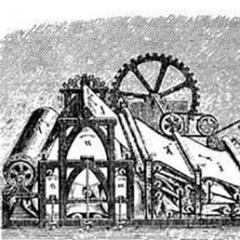Who is better to be a nurse or a doctor? Nurse - chief assistant physician
The woman is wearing the same clothes as the doctor, which makes it easy to confuse them in the corridor of the clinic or even at the reception. Perhaps this is how one can describe a nurse without going into the details of her work. If you want to help people, and biology and chemistry are your favorite subjects, take a closer look at this profession. I’m ready to tell you in more detail who a nurse is, what she does and where to apply.
The profession originated in the 11th century, it was then that the sisters of mercy appeared, who initially helped women, and then men. And in the 17th century, there was an urgent need for nurses. It was then that numerous wars were fought, there were many wounded who needed first aid and care after difficult operations.
Painting Bozhego M. M. “Nurse” (1955)
Responsibilities of a nurse
A nurse (nurse) is a specialist with specialized secondary education who monitors and cares for patients. She is a faithful assistant to the doctor at the appointment and during treatment and operations. The nurse provides first aid to victims, performs simple manipulations (gives injections, measures blood pressure and temperature) and procedures, following the doctor’s orders. During the appointment, she writes down the results of the examination and the doctor’s recommendations. The nurse also issues certificates, referrals for examinations, etc. In addition, nurses are excellent administrators. For example, senior nurses manage the work of all other nurses, are responsible for household and medical supplies, and also monitor the completion of documentation.
Report on the nursing profession. By the way, to become a senior nurse you must have extensive work experience or obtain a higher education
Painting by A.I. Kuindzhi " Demonstration operation in the clinic of N. I. Pirogov"
What types of nurses are there?
Depending on the specific place of work, a nurse may have different specializations. The ward nurse observes and cares for patients who are in the hospital. The treatment room gives injections, vaccinations, takes blood for tests, and makes dressings. The district police officer monitors patients in the assigned area and performs procedures at home. An intensive care nurse cares for seriously ill patients, feeds, bandages, makes the bed, puts in a probe, IVs, and prepares for ultrasounds and operations. The nurse in the reception department refers patients according to the document for hospitalization or listens to the patient’s complaints and then refers them to the doctor on duty. She also helps the doctor when examining a patient and follows the doctor’s recommendations.
Personal qualities of a nurse
In addition to special knowledge, the nurse knows how to find a common language with patients and their relatives, and to cheer up the discouraged. Tactfulness, politeness, sensitivity, attentiveness, and responsibility help her in working with patients. Only a person in good health can endure frequent physical and emotional stress. Disgusted and impressionable people will have a hard time in this profession.
Florence Nightingale is a nurse who radically changed the understanding of medicine and nursing. Miss Nightingale's birthday is celebrated as International Day on May 12 nurseWhere to apply
You can study to become a nurse in And . Admission to medical college is accepted after 11th grade based on the average score of the certificate or passing score, which includes the average certificate score and CT results for Russian or Belarusian language and biology.
If you are looking at becoming a nurse, but are not entirely sure whether this job is right for you, take a free .
Good luck in choosing a profession!
If the material was useful to you, don’t forget to “like” it on our social networks
Nursing is a specialty whose importance can hardly be overestimated. Essentially, no doctor will be able to cope with his duties if he does not have such an assistant. Taking this into account, we can safely say that a nurse is indispensable in any clinic or hospital.
However, how much do we know about the duties that this employee performs? What kind of difficulties do they sometimes have to face? And what prospects await a girl who has chosen the path of a nurse?
General information about the profession
The nurse is first and foremost the doctor's right hand. Her main task is to follow the instructions of the doctor to whom she is assigned. This could be collecting tests, installing an IV, providing bed linen to the patient, and so on. That is, by and large, the role of the nurse is auxiliary.
But despite this, she is an important member of the staff of any medical institution. After all, the nurse takes upon herself the lion's share work, thereby relieving doctors. And they, in turn, will be able to devote more time to more important tasks: diagnosing diseases, prescribing a course of treatment, therapy, and so on.
How to become a nurse?
The duties of a nurse require appropriate education. You can get it at a medical college or school. The training takes from 3 to 4 years, depending on the chosen institution.
During this time, students will learn all the skills necessary to work in this specialty. In particular, they will study Latin (which is indispensable when writing recipes), methods of providing first aid medical care, basics of therapy, rules for using medications, and so on.

Statutory classification of nurses
When discussing this profession, one cannot ignore the fact that there is a classification of nurses. And, despite the fact that the education required is the same, the range of responsibilities is different for everyone.
So, what types of nurses are there?
- Chief nurse is the only position that requires higher education. Its main task is control. It is this employee who makes adjustments to the work of middle and junior medical staff.
- Senior nurse is a position assigned to each head of the department. The main function is to maintain order in the territory entrusted to it by managing its own subordinates.
- A guard nurse is a specialist who makes sure that patients strictly follow all the doctor’s instructions: take medications, follow bed rest or diet.
- Procedural nurse. She is the one responsible for the injections and IVs prescribed by the doctor. In addition, she collects samples and takes them to the laboratory.
- The operating room nurse is the surgeon's right hand. She prepares the operating room before the operation, checks that everything is in place, and brings everything necessary tool. In the future, she follows all the instructions that the surgeon gives her: give a scalpel, a clamp or, say, a tampon.
- A community nurse is a specialist assigned to a specific doctor. Most often, this position involves paperwork: filling out cards, working with documents, keeping records, and so on.
- The junior nurse is the lowest level of the hierarchy. Her responsibilities include caring for the sick and following orders from senior colleagues.

Required qualities
So, the duties of a nurse cannot be called too complex, especially when compared with the work of doctors. However, you should not underestimate them, because the health of another person is at stake.
Therefore, the future specialist must have the following personal qualities:
- good memory in order to remember many terms and names of medications;
- responsibility, because, as mentioned earlier, any mistake can cost a person his life;
- speed of reaction in order to make the right decision at a critical moment;
- compassion, because without it she will not be able to provide the sick with the care they need;
- strong nerves and psyche, since in medicine you will have to deal with many things, including unpleasant ones.

What will you have to do at work?
Each medical institution has its own instructions (job description) for nurses. This document contains a complete list of all responsibilities of this employee, and upon taking up the position, he is required to familiarize himself with it. Describe all possible requirements specified in this document, is simply not possible, since they can change depending on the policies of the institution.
However, here are a few examples:
- First of all, the nurse monitors the condition of the patients. He takes tests, inquires about their well-being and takes them to treatment procedures.
- Any nurse follows the instructions of doctors, especially if they relate to working with patients.
- This employee is also responsible for a number of procedures related to the treatment of the patient. So, nurses administer intravenous drips, give injections, conduct physical therapy, and give dosages of medications.
- In addition, nurses often work with hospital documentation. For example, they fill out patient cards, keep track of hospital equipment, submit documents for discharge, and so on.

Advantages and disadvantages of the profession
If we talk about the advantages, then first of all we need to note the high demand in the labor market. Almost every specialist can count on a free place in their city.
However, there are also disadvantages. In particular, low wages and lack of career growth. Even with all your desire, you simply won’t be able to rise above the position of head nurse.
Medicine is one of the most complex fields of activity. Firstly, treating people is a high responsibility, and secondly, you need to continuously learn and improve your skills. Not every person, let's face it, has the ability to become a doctor.
Therefore, it is no coincidence that in the healthcare system it is customary to divide workers into several categories: junior medical personnel, nursing staff and senior medical personnel.
Nurse and nurse: who is more?
Historically, it has been women who most often act as medical assistants, which is why this profession is usually classified as “female.” The first nurses were nuns, so the word “sister” denoted membership in the clergy. Then they helped in caring for the sick and had a very indirect relationship with medicine.
Over time, the list of their responsibilities expanded. Military operations also played an important role in this, when field surgeons needed help during urgent operations. At such moments, gender did not play a big role, so nurses acquired some knowledge of medicine and provided necessary help physician, not just patient care.
A nurse is a male version of the profession of a nurse. His responsibilities are exactly the same as those of a nurse. The only obstacle to the work of nurses is social stereotypes, as well as low salary levels. For this reason, in Russia, for example, there is 1 nurse for every 3 nurses.
But at the same time, medical institutions intended for people with mental illnesses, on the contrary, give preference to nurses because they have greater physical strength.
Modern nurses are employees of healthcare organizations with specialized secondary specialized education in the areas of “Nursing” and “General Medicine”. It is strictly prohibited to work without such education.
Areas of activity of a nurse
There are many job options for a nurse. Here are some of them:
district nurse - helps the doctor in the clinic to receive patients;
visiting nurse - most often works in anti-tuberculosis, dermatovenerological, and psychoneurological dispensaries;
procedure nurse– carries out procedures for collecting blood and intravenously administering medications;
ward nurse - works with patients who are accommodated in the hospital, monitors compliance with prescribed recommendations;
operating room nurse - works in tandem with a surgeon, assisting in the operating room.
Depending on the level of responsibility, two categories of these specialists can also be distinguished - senior and junior nurses. The junior nurse works exclusively with patients, while the senior nurse also takes on organizational responsibilities. She coordinates the work of other nurses in the health care facility, draws up duty schedules, checks the availability of medications and necessary equipment, and also works with documentation.
Responsibilities of a nurse and nurse
The main responsibilities of this category of medical personnel can be considered the following:
communication with patients, monitoring the condition of patients;
carrying out procedures prescribed by a doctor;
sterilization of instruments;
collecting tests as prescribed by a doctor;
filling out documents, collecting statistics.
In order to fulfill assigned responsibilities medical worker should know:
human anatomy;
medical terminology;
symptoms of diseases, basic principles of their treatment;
names medicines, their pharmacological properties.
Place and working conditions
In addition to healthcare institutions, nurses are required in kindergartens and schools, as well as military units. In addition, all these organizations can be private or public. Therefore, nurses are extremely sought-after specialists.
In this regard, the schedules may be completely different. For example, in hospitals most often shift schedule work, with not only day shifts, but also night shifts. If we are talking about educational institutions, then this is standard working week including all weekends and public holidays.
Where to study to be a nurse
The directions “Nursing” and “General Medicine” are actively represented in all medical colleges, where it is possible to enter 9th and 11th grades. On average, training in the specialty takes four years.
In addition, medical universities offer various courses to improve the qualifications of health workers. And regardless of the direction of activity and place of work, a specialist must regularly not only confirm his qualifications, but also acquire new knowledge in the field.
Career prospects for a nurse
An employee with specialized secondary education can obtain the position of senior nurse. In addition, nurses can also obtain higher medical education to continue their career as a doctor. In this case, previously gained experience will become an undeniable advantage.
Personal qualities of the nursing profession
Not everyone is able to choose medicine, because this field requires constant improvement of oneself as a specialist. But not everyone can learn throughout their life. In addition, work in medical institution puts a lot of pressure on a person’s mental system. Medical personnel regularly have to witness pain and death, many cannot stand it.
Thus, important qualities To work as a nurse or nurse, the following may be considered:
-
compassion;
stress resistance;
responsibility;
communication skills;
discipline;
diligence;
punctuality.
Salary level for the nursing profession
On average similar medical specialists earn about 30,000 rubles.
Pros and cons of being a nurse
The positive aspects of this profession include the following:
relevance and relevance;
many options and areas of work;
prospects for career growth and development.
The disadvantages of the profession are:
high level of responsibility;
stressful situations At work;
low salary level;
the need to constantly learn and improve the level of qualifications.



